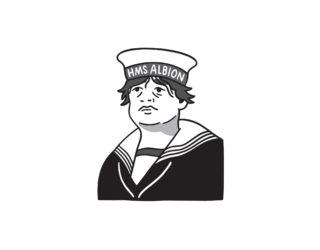The rise of the unlikely hype band
Reasons to be cheerful

Reasons to be cheerful
Mark Fisher’s 2008 thesis Capitalist Realism is, for much of the British left, a foundational text. A profound and passionate study of the cultural stasis and political rank-closing that followed the triumphalist “end of history” narrative at the close of the 20th century, it makes connections between many aspects of public life with a degree of clarity and metatextuality that had rarely been seen before. Late capitalism, Fisher argues, has attained such hegemony in western society that alternatives have become not only unrealistic but inconceivable.
The resulting “slow cancellation of the future” – i.e. a foreclosure of tangible societal change – not only has severe political implications, but cultural and humanitarian ones too. Epidemics of mental ill-health, meaningless service jobs, submersion into continuous, directionless entertainment at all times, widespread tendencies towards the comfort of the familiar and nostalgic and away from the shock of the new; in Mark Fisher’s opinion, such ills are impossible to divorce not only from one another, but from the political environment as a whole.
That book was published in 2008, as the financial crash led many to believe that we may not have witnessed the end of history, that different realities may begin to reveal themselves. For a long time, those changes were anticipated in vain.
Yet 11 years on, I wonder if we’re reaching not a turning point exactly, but certainly a subtle shift in the cultural weather. This is not to say that I welcome the social tumult of our time – the potential for irreversible, species-wide damage has never been more acute – nor am I making the same risible argument as Pete Doherty did recently, claiming that music flourishes under disastrous social conditions. He might think that “our brave English boys in the band always do their best with their backs against the bloomin’ wall, oh yes come on let’s sail the good ship Albion back to Dunkirk” (I may be paraphrasing slightly), but I’d rather have good schools, hospitals and breathable air than a few decent tunes, thank you very much.
In no way am I romanticising the social mess we’re in. But if there’s one slight silver lining here it’s that I think traces of future-building are beginning to re-emerge from the lager-doused ashes of British cultural life. As the political consensus is subjected to more robust questioning, so too are the received musical and artistic wisdoms that have informed a great deal of mainstream popular culture in this country for some time.
Of course, the experimental, progressive underground has never actually gone away. DIY culture has continued to produce fantastic stuff throughout the period of capitalist realist dominance, and just occasionally its head appears above the parapet – grime, for example, being one of the few genuinely new, ground-up movements to have broken through to the mainstream British consciousness in the last couple of decades. The difference now, as far as I can see, is that the very mainstream that has been stagnating so severely for, well, most of my life, is showing signs of being ready to receive new musical ideas in a way that I don’t remember observing very often at all.
There are many ways in which this is manifesting, but to take one simple example, let’s look at the concept of the hype band. Growing up, bands that received the most excitable hype and therefore the most prominent mainstream attention (albeit often for a pretty brief period), were pretty dire, almost all directly revivalist and small-c conservative. The Vaccines, Palma Violets, Mumford & Sons, even to an extent the Fat White Family: these were hardly the pioneers of brave new worlds.
Yet look at the current crop of so-called hype bands, and the picture is rather different. The hectic math-noise of Black Midi, the uneasy post-rock-meets-free-jazz of Black Country, New Road, the ferocious cosmicality of The Comet Is Coming. Beyond typical band setups, too, the acts that are garnering the most potent mix of critical acclaim and commercial success are also possessed of a certain boldness, a certain progressivism, that’s been sorely missed in recent years. Just look at slowthai’s kinetic, razor-sharp brand of rap (at last, UK hip-hop that’s neither grime nor shit!), or the audiovisual future-dancehall of GAIKA, who recently appeared in a much-shared video interviewing Jeremy Corbyn.
I’m not saying that British society’s apparently inexorable collapse is a cause for celebration, or a catalyst for excellent music – after all, as Fisher makes clear in Capitalist Realism, the quality of both our artistic and political lives are intrinsically linked. Even if it was such a catalyst, it goes without saying that such suffering would not be a worthwhile price to pay for some modest cultural progress. But at least as the cracks in political consensus are beginning to show, new musical potentialities are slowly revealing themselves too. In bleak times, it’s important to cling onto such snatches of hope, however slim they may be.